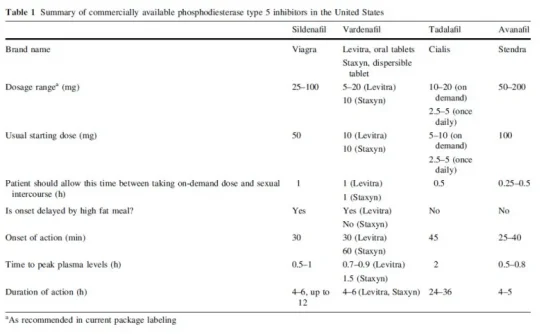Nelson Vergel
Founder, ExcelMale.com
The class of drugs currently prescribed to treat male erectile dysfunction has been flagged for its potential to be included in new trials for anti-cancer drugs, in a new clinical study published today in the open access journal, ecancermedicalscience.

The paper is the latest publication from the Repurposing Drugs in Oncology (ReDO) project, an international collaboration between the Anticancer Fund, Belgium, and USA-based GlobalCures.
In their paper, the researchers have identified that selective phosphodiesterase 5 (PDE5) inhibitors have the potential to be used in new drug trials. These PDE5 inhibitors are a class of drugs that include sildenafil, tadalafil, and vardenafil (more commonly known by their brand names Viagra, Cialis, and Levitra).
"In many respects, sildenafil is the ultimate repurposing success story," says Dr. Pan Pantziarka of the Anticancer Fund. "It was originally developed for angina, repurposed for erectile dysfunction and then again for pulmonary arterial hypertension, and now it has the potential to be repurposed again as an anti-cancer drug."
Like many of the other drugs that the Repurposing Drugs in Oncology (ReDO) Project has profiled in publications in ecancermedicalscience, PDE5 inhibitors show a wide range of mechanisms of action in different cancer types, such as glioblastoma multiforme - a rare disease where clinically meaningful advances are desperately needed.
"Checkpoint inhibitors have radically altered the landscape in oncology, but there remain significant challenges in terms of increasing the number and duration of responses," Pantziarka explains.
The paper also explores the issue that finding new agents able to cross the blood-brain-barrier is a challenge which severely limits the range of drugs available to treat brain tumors. There is some evidence that drugs not currently licensed for cancer treatment like the PDE5 inhibitors are able to increase permeability so that drug delivery to brain tumors is improved - thereby potentially opening the door to new therapeutic options for patients.
There are a number of active Phase I and Phase II clinical trials on-going at present. These trials are largely based on to the strong level of clinical evidence in a number of specific indications and it is to be hoped that positive reports from these trials will be forthcoming in the future. The data are strongest for clinical trials of PDE5 inhibitors, in combination with other agents, in the following cancer types:
(a) HNSCC
(b) Glioblastoma
(c) Pancreatic cancer
(d) Medulloblastoma
(e) Waldenstrom’s macroglobulinemia
(f) Melanoma
The perioperative use of PDE5 inhibitors in combination with other perioperative therapies is also of interest in the following cancers:
(a) Colorectal cancer
(b) Breast cancer
(c) HNSCC
The diagnostic and predictive significance of PDE5 expression in oncology is also an area that warrants additional attention. This is particularly the case in a precision oncology context where patient selection on the basis of PDE5 expression may be required.
Full Paper

The paper is the latest publication from the Repurposing Drugs in Oncology (ReDO) project, an international collaboration between the Anticancer Fund, Belgium, and USA-based GlobalCures.
In their paper, the researchers have identified that selective phosphodiesterase 5 (PDE5) inhibitors have the potential to be used in new drug trials. These PDE5 inhibitors are a class of drugs that include sildenafil, tadalafil, and vardenafil (more commonly known by their brand names Viagra, Cialis, and Levitra).
"In many respects, sildenafil is the ultimate repurposing success story," says Dr. Pan Pantziarka of the Anticancer Fund. "It was originally developed for angina, repurposed for erectile dysfunction and then again for pulmonary arterial hypertension, and now it has the potential to be repurposed again as an anti-cancer drug."
Like many of the other drugs that the Repurposing Drugs in Oncology (ReDO) Project has profiled in publications in ecancermedicalscience, PDE5 inhibitors show a wide range of mechanisms of action in different cancer types, such as glioblastoma multiforme - a rare disease where clinically meaningful advances are desperately needed.
"Checkpoint inhibitors have radically altered the landscape in oncology, but there remain significant challenges in terms of increasing the number and duration of responses," Pantziarka explains.
The paper also explores the issue that finding new agents able to cross the blood-brain-barrier is a challenge which severely limits the range of drugs available to treat brain tumors. There is some evidence that drugs not currently licensed for cancer treatment like the PDE5 inhibitors are able to increase permeability so that drug delivery to brain tumors is improved - thereby potentially opening the door to new therapeutic options for patients.
There are a number of active Phase I and Phase II clinical trials on-going at present. These trials are largely based on to the strong level of clinical evidence in a number of specific indications and it is to be hoped that positive reports from these trials will be forthcoming in the future. The data are strongest for clinical trials of PDE5 inhibitors, in combination with other agents, in the following cancer types:
(a) HNSCC
(b) Glioblastoma
(c) Pancreatic cancer
(d) Medulloblastoma
(e) Waldenstrom’s macroglobulinemia
(f) Melanoma
The perioperative use of PDE5 inhibitors in combination with other perioperative therapies is also of interest in the following cancers:
(a) Colorectal cancer
(b) Breast cancer
(c) HNSCC
The diagnostic and predictive significance of PDE5 expression in oncology is also an area that warrants additional attention. This is particularly the case in a precision oncology context where patient selection on the basis of PDE5 expression may be required.
Full Paper














